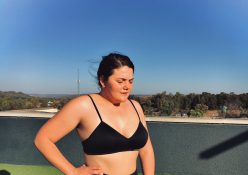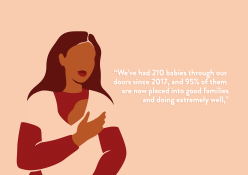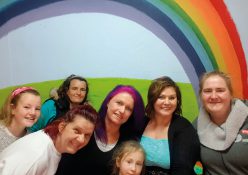Women supporting women to me means that we should empathise with each other’s experiences and build on one another’s successes. That even though we come from different backgrounds and have very different stories, we face similar challenges with our bodies, lives and even in the workplace, just by moving in this world and being a woman
In a world where society still marginalises women and many have no voice, we have the privilege of living in a country where women actively advocate and champion other women. There is always more to do, but in this Women’s Month issue, we want to shine a light on some of the heroes behind several inspiring women-centric initiatives. While we cannot feature every amazing organisation supporting women in one article, we would like to thank every organisation doing their bit, in the spaces that they occupy, to uplift and empower women.
ILoveBoobies
When it comes to advocating for other women, ILoveBoobies is proving that your actions sometimes speak louder than words and instead of using their voices, the sales from their colourful and bold socks have funded 4972 breast screenings for women facing financial challenges in South Africa. ‘One in eight women of almost any group will experience an invasive breast cancer in her lifetime. That means that every time you sit in a restaurant or in a meeting, one out of every eight women in that room will in some way have to deal with the impact of breast cancer.
If something happens to a woman, what happens to her family and community?’ says Nicky Webb, the Director of ILoveBoobies. The ILoveBoobies charity was formed in 2017, to address this need. The Charity raises funds and awareness by using sports and events as a platform with the mantra that your greatest chance against cancer is to lead a healthy and active lifestyle. They make colourful and cool apparel locally and it carries the brand proudly.
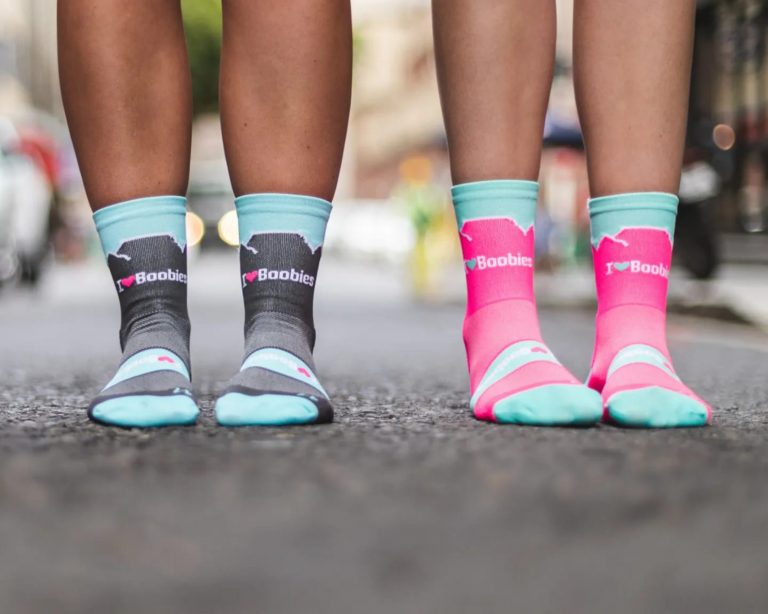
It also serves as advertising for their messaging whenever people are seen out and about wearing their socks. That is how the #fivepairsonescreening initiative started and today for every five pairs of socks sold, one woman with limited funds or limited access to medical facilities, gets a screening. ‘Our mission is to help educate people around the importance of early detection and being aware of your body. In Europe and America, the survival rate of breast cancer is much higher, because people have easier access to medical treatment. At ILoveBoobies we take the screenings to people.
A woman in a rural community will not easily give up a day’s work and pay to have her breasts checked, yet she should be able to. So we take it to these women and the sales from our merchandise or sponsored rides, pays for it,’ says Nicky. ‘Recently we did a screening at a company and seven out of the 130 women screened were referred for further tests. Early detection saves lives and when we go out and do screenings, we teach women how to do their own breast exams, so that they leave empowered.
We also give each woman a pair of socks, as a reminder to do a breast exam whenever she sees the socks. Many do not necessarily have access to social media and other platforms, so what we do is really important. Government cannot get to everyone, so as humanitarians, we have to try to do more.’
The Grace Factory
Another organisation who believes there is always more to do and more people to reach is The Grace Factory.‘Our story started in 2012, when our founder Amy gave birth to her first child, Erin Grace. It’s where our name comes from and it’s also where the inspiration came from. As her baby grew, Amy had a lot of clothes and baby products she wasn’t using anymore. She didn’t have any pregnant friends or family who she could give them to, so she would drive to her local grocery store and find out which of the car guards had babies at home to donate to,’ explains Sarah Cressey, co-director at The Grace Factory. In 2015, Amy had her second baby prematurely and this motivated her to start making maternity packs for premature babies as well.
As people started hearing about the work that Amy was doing, the word and donations spread quickly. Eventually, The Grace Factory charity was officially registered, and to date they have already given out more than 20 000 maternity packs and assisted more than 200 homes and organisations. Sarah says their mission is to assist as many mothers in need as possible. Becoming a mom is already stressful and can be very overwhelming, without having to worry about the essentials such as clothing, toiletries and nappies.
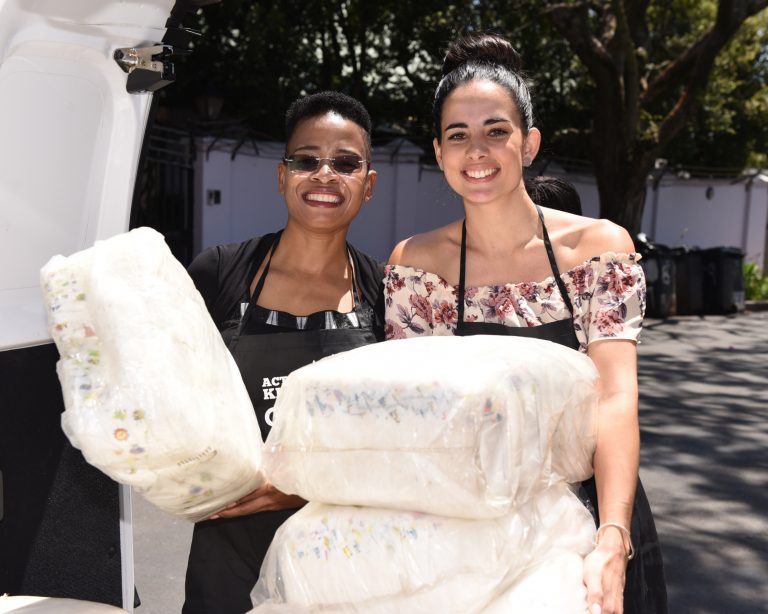
Most of the mothers who receive a maternity pack from The Grace Factory don’t have anything to help them get through the first two months of motherhood. Some are young mothers who have had unplanned pregnancies, some are women struggling financially and others are victims of gender-based violence, with unplanned families. But no matter the reason for the need, The Grace Factory aims to restore dignity to needy mothers and help them feel valued.
‘Child abandonment is a big problem and if we can help a new mom feel less stress, it could prevent them from making the difficult decision to abandon their child out of desperation and overwhelmed feelings,’ says Sarah. ‘We rely on our volunteers and we really couldn’t do all that we do without the kindness of every person who has donated or has offered to wash, iron or pack a maternity pack. We try to give moms only the best items, so we make sure that we wash, iron and neatly present each donation before we give them to a mom.’
Sha’p Left
There are so many ‘sheroes’ in our communities, but in Bellville, Cape Town, the nurses at the Sha’p Left Centre have been creating convenient and accessible healthcare to those who need it most, since November 2019. More than 700 people have received treatment at the Sha’p Left since it opened three years ago. The centre meets the needs of patients working in and travelling through Bellville. Many of those workers would otherwise be required to take time off work to visit their local clinic for health appointments and to access chronic medication, losing much-needed daily income.
The centre is convenient, accessible and well managed. Nursing staff, who receive business and technical training, manage the centre, this has inspired many of them to become medical entrepreneurs running their own business under their own practising licences. This project between the Greater Tygerberg Partnership (a non-profit organisation) and Cipla Foundation, is an example of how partnerships between the public and private sector can address the fundamental needs of an urban population in an innovative, easily replicable model.
The Sha’p Left concept is quite simple, providing primary healthcare without the cost or time required to build new facilities from scratch. The centre is constructed with three fully-fitted containers craned into place and connected to basic utility services. Once the containers have been fitted, the centre can be operational within two weeks. Warren Hewitt, CEO of the Greater Tygerberg Partnership, says that NPO work is known for being challenging and in the social development space, there are many mountains to climb. ‘The biggest challenge that we face is holding the relational link between the slow-moving public sector and the hyper-flexible private sector.
However, the community enthusiasm with which our projects are received far exceeds the frustrations of daily tasks,’ he says. Mandisa Swart, an on-duty nurse at the healthcare hub couldn’t agree more and says while working at various government clinics, she realised there is a really big gap to fill in terms of providing healthcare services. ‘Patients often cannot be seen at a time and a place that is convenient for work. This healthcare hub fills that gap because it is situated next to the Bellville public transport interchange). I have always had a passion for starting my own business and I believe that this will allow me to make a massive difference in my own life and in the Bellville community.’
Words by Tarren-Lee Habelgaarn
Photography: Courtesy Images


